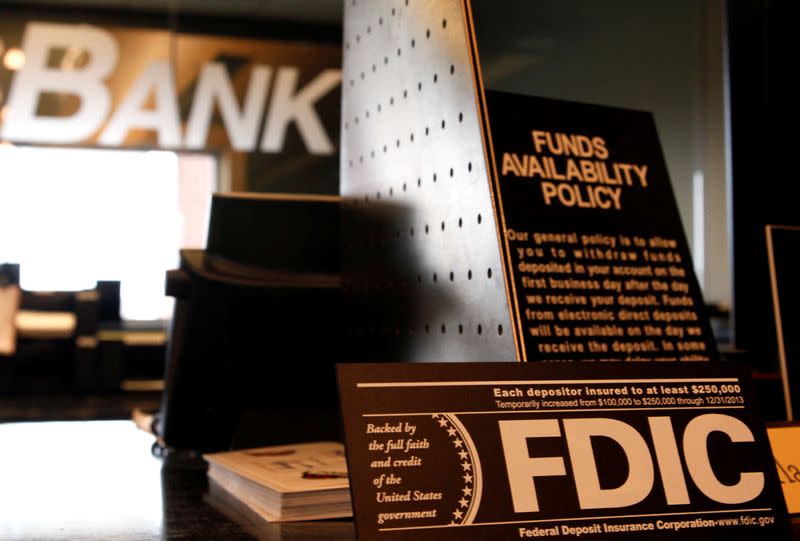Analysis-US FDIC chair nominee likely has the votes but confirmation process could drag

By Pete Schroeder and Michelle Price
WASHINGTON (Reuters) - Christy Goldsmith Romero will likely win enough votes to be confirmed as U.S. Federal Deposit Insurance Corporation chair but Republicans are likely to slow walk the process.
President Joe Biden last week nominated Goldsmith Romero, a Democratic commissioner at the Commodity Futures Trading Commission, to replace Martin Gruenberg who is stepping down after a probe found widespread sexual harassment at the agency.
Beyond safeguarding deposits and supervising banks, the FDIC is a key player in rule-writing efforts that would impose new guardrails on banks and their executives. Getting Goldsmith Romero confirmed just months before the November presidential and congressional elections could stabilize leadership at the agency for years to come.
The White House wants her confirmed as soon as possible, said a person familiar with the process, and Sherrod Brown, the Democratic chair of the Senate Banking Committee which handles FDIC nominees, is targeting an ambitious timeline. He aims to hold her first hearing the week of July 8, Reuters reported.
Nominees require 51 votes to be confirmed in the evenly divided Senate where Democratic Vice President Kamala Harris can break a tie, but fierce opposition from Republicans and industry groups has in the past created cracks among Democrats and derailed the process.
While that is unlikely in Goldsmith Romero's case, the prominence of the role and contentious Senate dynamics will likely slow the process, leaving Gruenberg to hang on for potentially a few more months, according to Washington analysts and insiders.
"The likeliest scenario in our view is that this nomination will be slow walked, face some headwinds ... and stall in the near-term," said Isaac Boltansky, director of policy research at brokerage BTIG, wrote in an email to Reuters.
An attorney with a background in enforcement who previously oversaw a 2009 crisis bank bailout program, Goldsmith Romero is backed by Democratic progressives but is generally seen as a non-contentious pick and has influential supporters in Republican circles, said two of the people. She was unanimously confirmed by the Senate twice before.
Brad Bondi, a prominent Washington attorney and registered Republican who has known Goldsmith Romero for over a decade told Reuters she was an "honest, intelligent, hardworking and fair" consensus-builder who will work across party lines.
Top congressional Republicans struck a neutral tone on Goldsmith Romero last week, with Senator Tim Scott, the most senior Republican on the Senate Banking Committee, saying he would review her qualities for the job.
His team has not yet taken a stance on her nomination, said one person briefed on the matter.
To be sure, past casualties of the nomination process show that previous Republican support does not guarantee success.
Sarah Bloom Raskin withdrew her nomination for the Federal Reserve's top regulatory job in 2022 after moderate Senate Democrat Joe Manchin joined Republicans in refusing to support her over her prior comments on climate change. She had been unanimously approved to a Fed role in 2010 and a Treasury Department role in 2014.
And aside from the FDIC's cultural problems, there are other high-stakes issues on the table. The FDIC is still grappling with the fallout from bank failures last year which exposed supervisory issues at the agency, and is trying to finalize bank capital hikes and other rules on bank debt, executive pay and mergers which are opposed by Wall Street banks and many Republicans.
But Republicans' statements suggest they "may not go all out to defeat Goldsmith Romero and will declare victory for having ousted Gruenberg," said Ian Katz, managing director at policy research firm Capital Alpha Partners.
Goldsmith Romero and a spokesperson for the FDIC declined to comment. In a statement to Reuters, Brown said he aimed to "get her in this position as quickly as we can."
FLOOR VOTE
Still, Republicans will likely force a lengthy confirmation process, giving them more time to embarrass Democrats over their handling of the FDIC scandal and to grill Goldsmith Romero over her stance on capital hikes and other rules, said analysts.
Some critics of Goldsmith Romero's nomination say she lacks the bank supervision experience for the role, while hardline Republicans have vowed to oppose Biden's nominees to protest former President Donald Trump's conviction last month.
If one Senator objects to a nominee their confirmation must go to a full Senate debate and recorded vote, potentially sucking up hours of floor time which is limited with the chamber due to be out most of the summer through early September.
One Senate aide said a floor vote was the likely route.
While Republicans have called for Gruenberg to resign, they may also spy a strategic advantage in allowing the process to drag through November, said analysts. If presumptive Republican presidential nominee Trump retakes the White House, he could shift the balance of power at the FDIC toward Republicans who could more easily oust Gruenberg than a freshly confirmed Goldsmith Romero, allowing Trump to then nominate a Republican in Gruenberg's place.
Goldsmith Romero's nomination will also be competing with other Democratic priorities, including lifetime judicial nominees and so-called messaging bills on hot-button issues like reproductive rights which Democrats hope to use to highlight distinctions with Republicans ahead of the election.
After September, Senators are scheduled to be campaigning in home states rather than tied up in Washington.
Ed Mills, an analyst at Raymond James, wrote on Friday that Goldsmith Romero's nomination was likely. "But a short time frame and limited number of Senate days in session introduces some uncertainty."
(Writing and reporting by Michelle Price. Reporting by Pete Schroeder. Additional reporting by David Morgan; Editing by Nick Zieminski)

 Yahoo Finance
Yahoo Finance 